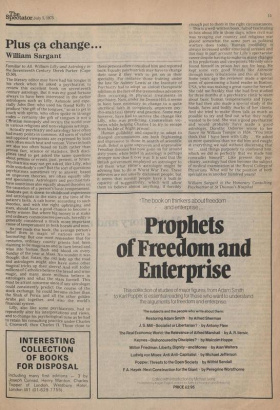Plus ca change...
William Sargant
Familiar to ALL William Lilly and Astrology in the Seventeenth Century Derek Parker (Cape £5.50).
The literary editor may have had his tongue in his cheek when he asked a psychiatrist to review this excellent book on seventeenth century astrology. But it was my good fortune always to have been interested in the earlier astrologers such as Lilly, Ashmole and especially John Dee, who used his friend Kelly to produce "the gift of the tongues," so as to get in touch with spirits, who often spoke in 'strange codes — certainly the gift of tongues is not a Cltristian monopoly and occurs the world over in various religions and non-religious settings. Actually psychiatry and astrology have often had many points in common. All sorts of varied and opposed viewpoints are expressed by both with often much heat and venom. Views in both are also too often based on faith rather than Proven fact, science or statistics. Both disciplines tend to get asked the same questions about persons or events, past.' present. or future. Psychiatrists may not get asked, like Lilly, who stole somebody's cow? But the sort of questions psychiatrists sometimes try to answer, based on unproven theories, are often equally silly and speculative. Astrologers and psychiatrists have sometimes also equally absurd theories on the causation of a person's basic temperament. Analysts put it down to childhood experience and astrologists to the stars at the time of the patient's birth. A cab horse, according to such theories, and with the right upbringing and stars, should have a good chance to become a Derby winner. But where big money is at stake and ordinary commonsense prevails, heredity is generally considered a much more important cause of temperament in both horses and men.
As one reads this book, the average person's belief then in magic of various sorts is fascinating. But one must remember that for centuries, ordinary county priests had been claiming to be magicians and to turn bread and wine into human flesh and blood on every Sunday of the year at Mass. No wonder it was thought that Satan, the old lady up the road and astrologers might also have some other magical tricks up their sleeve! And still today millions of Catholics believe the bread and wine magic, and many more millions believe in astrologers and what the stars foretell. This must be arrant nonsense since if any astrologer could consistently predict the course of the stock exchange. he could become richer than the Shah of Persia and all the other golden Arabs put together, and also the world's financial system.
Lilly, also like some psychiatrists, had to repeatedly alter his interpretations and views, and to change his psychological tune as he had to retain his consulting practice under Charles I, Cromwell, then Charles II. Those close to these persons often consulted him and reported back. Equally psychiatrists may have to change their tune if they wish to get on in their speciality. For instance those training under the late Sir Aubrey Lewis at the Institute of Psychiatry had to adopt an almost therapeutic nihilism in the face of the tremendous advances then occurring in physical treatments in psychiatry. Now, under Sir Dennis Hill, it seems to have been necessary to change to a quite uncritical faith in completely unproven psycho-analytical theory and practice. Some may however, have had to survive the change like Lilly, who was predicting Croinwellian victories while helping Charles I to try to escape from his Isle of Wight prison!
Human gullibility and capacity to adapt to changed circumstances are both frightening and impressive to those in search of scientific truth. Belief in quite unproven and unprovable Freudian theories has now gone on for around sixty years, while belief in astrology is perhaps stronger now than it ever was. It is said that the British government employed an astrologer to tell them what Hitler's astrologer might be advising him to do in World War Two. These believers are not usually dishonest people; but it seems that normal people have a built-in capacity of suggestibility, which will allow them to believe almost anything, if forcibly enough put to them in the right circumstances. This is a well-written book, full of fascinating tit-bits about life in those days, when civil war was ravaging our country and religious war played somewhat the same part as political warfare does today. Human credibility is always increased under emotional stresses and this may in part account for Lilly's spectacular career despite having to make so many changes in his predictions and viewpoints. He only once found himself in prison but not for long. He kept some very good friends like Ashmole through many tribulations and this all helped. Some years ago the reviewer made a special point of questioning a hand reader in Boston, USA, who was making a great name for herself. She told me frankly that she had first studied for three months at a psychiatric clinic to learn 'about basic human temperaments and types. She had then also made a special study of the hands, faces and bodily marks of 'her clients. And she tried to make them talk as much as possible to try and find out what they really wanted to be told. She was a good psychiatrist and would probably have made a good astrologer. Dorothy Osborne wrote to her fiance Sir William Temple in 1654, "You little think that I have been with Lilly ... He asked us more questions than we did him and caught at everything we said without discerning that we ... said things purposely to confound him; which we did so perfectly that we made him contradict himself". Like present day psychiatry, astrology had then become the subject of medical examination at the Royal College of Physicians. What will be the position of both specialities in another hundred years?
William Sargant is the Honorary Consulting Psychiatrist at St Thomas's Hospital.


































 Previous page
Previous page